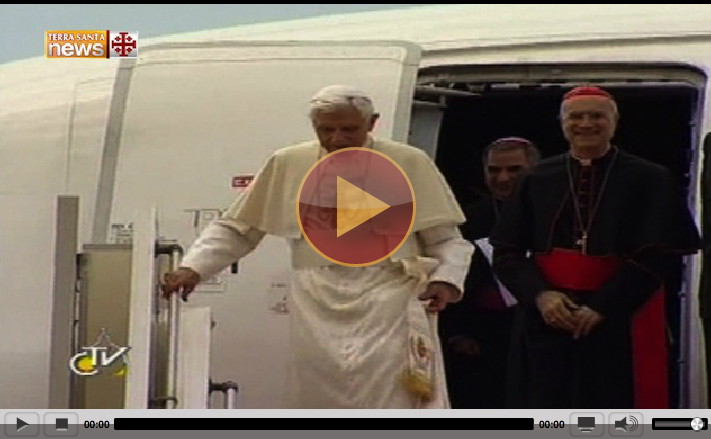
A pilgrimage of peace.” Benedict XVI arrived in Lebanon Friday, September 14, for a trip that will include the entire Middle East.
The Pope arrived in the country of cedars in response to President Suleiman’s invitation and to sign the Post-Synodal Apostolic Exhortation for the Middle East.
Upon exiting the airplane, the resounding welcome of the Lebanese people shook the Rafic Hariri Airport: Christians, Muslims, Druze, all very close to the Pontiff, curious about what he would say to them. The Syrian Bishops of Aleppo who were supposed to be present were not able to travel because of the war that is ravaging the country.
The Melkite Greek Basilica of Saint Paul was the place chosen for the signing of the Apostolic Exhortation. Benedict XVI has defined it as a means of finding what is essential, and what is essential—the Pope has said—is to follow Christ, in a difficult and sometimes painful context. But it is right now that the “victory of love over hate, of forgiveness over vengeance, of service over dominion, of unity over division” is celebrated. The exhortation is a document that also serves to open up authentic interreligious dialogue, based on faith in God, who is One and Creator, and to contribute to an ecumenism full of human fervor that draws strength from the truth and love of the Gospel.
His encounter at the presidential palace with members of the Lebanese government, religious leaders and cultural representatives was of central importance. The president of the Lebanese Republic, Suleiman, in his introduction to the Pope, focused on a few serious issues affecting the Middle East: the question of Jerusalem above all others, and the so-called Arab Spring that leaves much uncertainty in the entire region. After hearing the president’s words, the Pope replied with an invitation to all to return to the main values of civil co-existence: "It is a matter of saying no to vengeance, of recognizing one’s own faults, of accepting apologies without seeking them out, and finally of forgiving. Because only forgiveness given and taken, " explained His Holiness, "creates a long-lasting foundation for reconciliation and peace for all."
The Pope arrived in the country of cedars in response to President Suleiman’s invitation and to sign the Post-Synodal Apostolic Exhortation for the Middle East.
Upon exiting the airplane, the resounding welcome of the Lebanese people shook the Rafic Hariri Airport: Christians, Muslims, Druze, all very close to the Pontiff, curious about what he would say to them. The Syrian Bishops of Aleppo who were supposed to be present were not able to travel because of the war that is ravaging the country.
The Melkite Greek Basilica of Saint Paul was the place chosen for the signing of the Apostolic Exhortation. Benedict XVI has defined it as a means of finding what is essential, and what is essential—the Pope has said—is to follow Christ, in a difficult and sometimes painful context. But it is right now that the “victory of love over hate, of forgiveness over vengeance, of service over dominion, of unity over division” is celebrated. The exhortation is a document that also serves to open up authentic interreligious dialogue, based on faith in God, who is One and Creator, and to contribute to an ecumenism full of human fervor that draws strength from the truth and love of the Gospel.
His encounter at the presidential palace with members of the Lebanese government, religious leaders and cultural representatives was of central importance. The president of the Lebanese Republic, Suleiman, in his introduction to the Pope, focused on a few serious issues affecting the Middle East: the question of Jerusalem above all others, and the so-called Arab Spring that leaves much uncertainty in the entire region. After hearing the president’s words, the Pope replied with an invitation to all to return to the main values of civil co-existence: "It is a matter of saying no to vengeance, of recognizing one’s own faults, of accepting apologies without seeking them out, and finally of forgiving. Because only forgiveness given and taken, " explained His Holiness, "creates a long-lasting foundation for reconciliation and peace for all."

